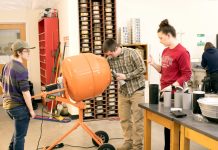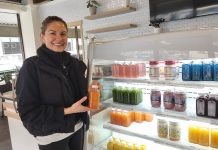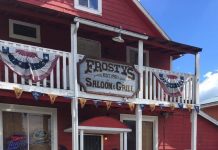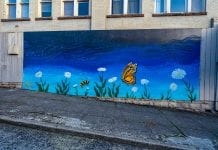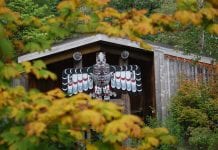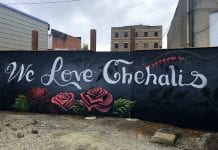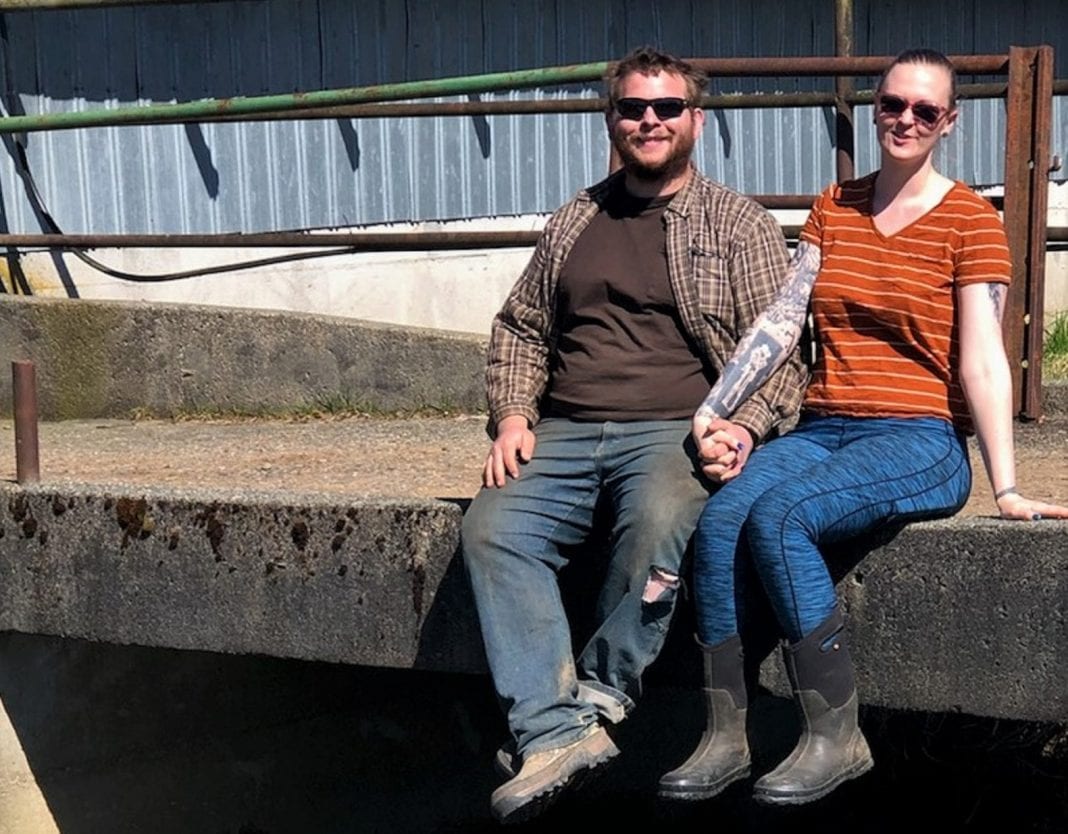Submitted by Kathy Jacobson, for the Chehalis Basin Lead Entity
Two years ago, Lucas and Paterka Town bought a 22-acre parcel of land in the outskirts of Onalaska. They have been hard at work transforming it into a productive and vibrant organic farm. Root Cellar Farm joins the 500 farms regionally certified as “Salmon Safe.”
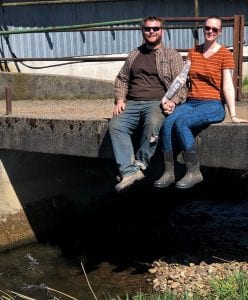
Lucas and Paterka met at The Evergreen State College (TESC). City of Yelm native Lucas shared details on how they met. “I was taking business programs at Evergreen State College. I didn’t have anything lined up for the spring quarter, so I decided to explore the organic farm program, where we were expected to write a business plan. I ended up really enjoying learning about the theory of farming. After graduation, I took an internship at Let Us Farm, an organic farm located outside of Oakville (now in the Washington Farmland Trust program). There, I learned how to grow lettuce for salads and the benefits of cultivating tractors.
Paterka focused on the visual arts at Evergreen. “I grew up on a horse farm on Vashon Island. Horses are a lot of work! I developed a strong work ethic that is needed today in my work as a farmer,” Paterka said.
After working for other farmers, Lucas rented a ¼ acre of farmland and honed his skills as a farmer.
Lucas and Paterka married and started to look for land they could farm. “Because both of my parents are entrepreneurs, I knew I also wanted to work for myself,” said Paterka. After searching for affordable farmland, they found land on the outskirts of Onalaska. Their farm was historically a dairy farm many years ago.
“We have worked really hard getting our farm up and running. We hauled away 6 tons of garbage, put up deer fencing, redid the roof on the house to make it habitable, redid the horse barn, and put in irrigation lines,” Paterka said.
“When we first started the farm, we focused mainly on storage crops such as garlic and potatoes. We thought it would be a good pun to name our farm ‘Root Cellar’ on being a “Root Seller,” Lucas said.
Today, Paterka and Lucas are starting with one acre in cultivation.
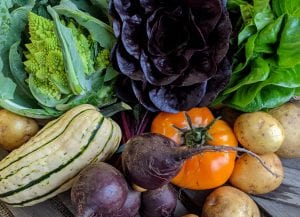
“Farmers do it all,” said Lucas. “Fix equipment, tend and harvest plants, market and sell products. I think that I am only one of two that went into farming after participation in TESC ’s organic farm program.”
Using her education from Evergreen, Paterka has created their farms’ website, develops branding, sells at farmers markets, and built their Community Supported Agriculture (known as CSA’s). They currently have 36 CSA shareholders and participate in the Longview Saturday Market.
“We also hope to participate in the Vancouver Farmer’s Market. We grow about 50 varieties of veggies, including carrots, lettuce, kale, onions, broccoli, and another 50 varieties of flowers. We also raise free-range eggs. In each of our CSA boxes, we include four recipes so people can experiment with some new veggies. I also provide a video update of the veggies of the week and what is happening on the farm that week. We love making wholesome, honest connections with our customers,” Paterka said.
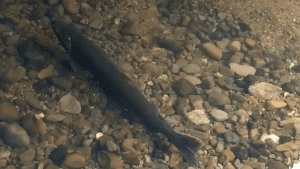
Salmon Safe Certification Program
In walking around their farm, viewing their fields, and seeing Kearney Creek that runs through their farm, Lucas reflected on why they went organic. “It’s our ethical choice and aligns with our values. Kearney Creek is so central to our farm. It starts in the hills east of us and drains into the South Fork of the Newaukum River. We love being able to see salmon in the fall, and it was especially important to obtain the Salmon Safe Certification, for our farm.”
The Salmon Safe Certification program helps farmers, golf course managers, vineyards protect their local watersheds through a focus on management practices in six primary areas: riparian area management, water use management, erosion and sediment control, integrated pest management and water quality protection, animal management, and biodiversity conservation.
“Because the majority of our Root Cellar organic farm practices benefit healthy ecosystems, they were already in alignment with the Salmon Safe Practices,” Lucas noted. “The only change we needed to implement was to cover our horse manure, which we did. Now it is given away on non-rainy days, and our farm received the Salmon Safe Certification.”
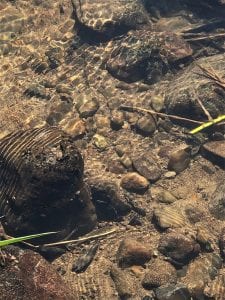
Lucas and Paterka have a great fondness for seeing the coho and steelhead that call Kearney Creek home at different times of the year. The cold, clean, clear, and consistent water of Kearney Creek is especially vital for coho salmon as they usually spend half of their life cycle rearing and feeding in streams and small freshwater tributaries.
The Salmon Safe standards were developed over a three-year period with biologists, agronomists, and farmers and tested in the field across various crops since the late 1990s at more than 900 farms regionally. Salmon Safe has become one of the nation’s leading ecolabels, and Root Cellar Farm joins with 95,000+ acres of farm and urban lands certified. For more information, please check out: salmon.safe.org.
Conservation Reserve Enhancement Program (CREP)
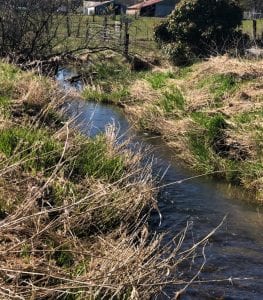
“We are excited to also be part of the CREP program,” said Lucas. CREP is the Conservation Reserve Enhancement Program, which partners with farmland owners in restoring salmon habitat. Farmers including Lucas and Paterka are compensated for voluntarily planting native vegetation along salmon-bearing streams rather than crops.
“In the near future, we will be planting willow and other native trees and shrubs along Kearney Creek,” noted Lucas. This native vegetation will form a buffer between agricultural land and salmon streams, keeping water clean and cool for salmon. Landowners are paid rent for the acreage they restore, and they receive a monetary bonus for enrolling in the program. This makes CREP a win-win for Washington farms and fish. For more information on CREP, please see their website or contact your local Conservation District.
In touring their farm, Paterka shared, “Our chickens are free-range and fed a strictly organic diet. We use our chicken manure as a soil amendment. As we do not use any pesticides, we use Reemay row cover to keep heat in and bugs out. We also have a couple of cows that act as our lawnmower.”
Paterka and her husband Lucas are young farmers, but that’s not the norm. According to the 2013 Washington State University Extension Fact Sheet, 90% of the 35,269 farms in Washington State are considered small farms, and the average age of a farmer is around 56-57 years old.
“Here in Onalaska, we have been fortunate enough to have found other young people to hang around with (outside, socially distanced). It’s nice not to feel like an island,” Paterka said.
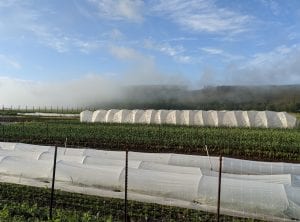
Going in the greenhouse, where it was nice and warm, with hundreds of plants were getting “their start” before being planted in the fields. “Take a look at the planting tables,” Lucas implored. “They are heated from below, so the roots of the veggies develop nice and strong, and so we don’t have to heat up the entire greenhouse.”
In going back outside and looking out over their farm, Lucas provided final reflections. “We really appreciate our CSA shareholders. They boost our morale. They understand the lives of farmers and the choices we are making for our customers. As farmers, we do so much thinking, from the amount of work that is sustainable, to the state of our “knees” and our salmon in Kearney Creek.”
For more information on Root Cellar, a Salmon Safe Farm, please check out their website.
For more information on how you can be involved in salmon restoration projects on your land, please contact Kirsten Harma, Chehalis Basin Lead Entity Coordinator, at kharma@chehalistribe.org or see their website.









